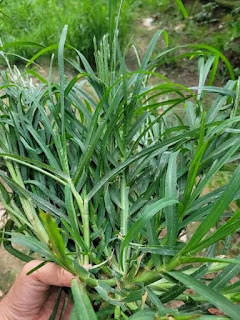Goosegrass, also known as Eleusine indica, is a common herb that has been used for centuries in traditional medicine for its impressive health benefits. Often overlooked in modern times, this powerful plant has roots deeply embedded in ancient healing practices. In this article, we will explore the health benefits of goosegrass, its various uses, a simple recipe to incorporate it into your diet, and the potential side effects you should be aware of.
The Health Benefits of Goosegrass
-
Supports Detoxification
Goosegrass has been used traditionally to aid in the detoxification of the body. It is believed to help eliminate toxins, promote healthy liver function, and assist in kidney health. The herb acts as a natural diuretic, encouraging the removal of excess fluid from the body, which helps in cleansing and promoting overall well-being. -
Promotes Digestive Health
Consuming goosegrass may help in improving digestion and soothing gastrointestinal discomfort. It is known to have mild laxative effects, promoting regular bowel movements and aiding in the treatment of constipation. The herb’s anti-inflammatory properties can also help soothe the digestive tract and relieve bloating or gas. -
Boosts Immune Function
Packed with antioxidants and nutrients, goosegrass has the ability to strengthen the immune system. It contains compounds that help combat infections and protect the body from harmful pathogens. Regular use of goosegrass can potentially reduce the risk of chronic illnesses and improve overall vitality. -
Reduces Inflammation
Goosegrass has potent anti-inflammatory properties that can help alleviate pain and swelling associated with conditions like arthritis or injuries. It may help to reduce inflammation in the body, providing relief from joint pain, muscle soreness, and other inflammatory conditions. -
Supports Skin Health
The herb is also beneficial for skin health. Goosegrass has antimicrobial properties that make it useful for treating minor skin infections, acne, and wounds. Applying goosegrass-infused oil or tea to affected areas may promote healing and reduce skin irritation. -
Helps in Weight Management
Some studies suggest that goosegrass may aid in weight management by promoting fat burning. The herb’s natural diuretic properties help eliminate excess water weight, and its ability to improve digestion may support a healthier metabolism.
Uses of Goosegrass in Traditional Medicine
Goosegrass is versatile and can be used in various forms:
- Tea: One of the most common ways to use goosegrass is by brewing it into a tea. Simply steep dried goosegrass leaves in hot water for 10-15 minutes. This tea is known for its detoxifying effects and digestive benefits.
- Tinctures: Goosegrass tinctures are available, offering a more concentrated form of the herb for therapeutic use.
- Poultices and Ointments: For external use, goosegrass can be made into a poultice to treat skin ailments such as wounds, burns, and rashes.
- Powder: The dried and powdered form of goosegrass can be added to smoothies or capsules to incorporate its health benefits into your daily diet.
Goosegrass Recipe: A Simple Detox Tea
Here’s a simple and effective recipe to make goosegrass tea, ideal for detoxification and improving digestion:
Ingredients:
- 1 tablespoon dried goosegrass leaves
- 1 cup boiling water
- Honey (optional, for sweetness)
Instructions:
- Add the dried goosegrass leaves to a tea infuser or directly into a cup.
- Pour boiling water over the leaves.
- Let it steep for 10-15 minutes.
- Strain the tea (if necessary) and add honey for a touch of sweetness.
- Enjoy this refreshing and detoxifying herbal tea daily.
Potential Side Effects of Goosegrass
While goosegrass offers numerous health benefits, it’s important to be aware of any potential side effects:
- Diuretic Effect: Due to its natural diuretic properties, goosegrass may cause frequent urination, which could lead to dehydration if not monitored.
- Low Blood Pressure: For individuals with low blood pressure, goosegrass might exacerbate the condition. It is advised to use the herb cautiously if you already suffer from hypotension.
- Allergic Reactions: Some people may experience allergic reactions to goosegrass, particularly if they have sensitivities to other plants in the Poaceae family.
- Interaction with Medications: As goosegrass can influence blood pressure and fluid balance, it may interact with medications such as diuretics or antihypertensive drugs. Always consult a healthcare provider before incorporating it into your routine if you’re on medication.
Top FAQs About Goosegrass
Q1: What is goosegrass used for in traditional medicine?
Goosegrass is used for detoxification, improving digestion, boosting immunity, reducing inflammation, supporting skin health, and aiding in weight management.
Q2: How can I use goosegrass at home?
Goosegrass can be used in various forms such as tea, tinctures, poultices, or powders. The most common and easiest way is to brew it as a tea.
Q3: Is goosegrass safe to consume?
Goosegrass is generally safe when consumed in moderation. However, it may cause side effects like frequent urination or interactions with certain medications. Always consult a healthcare professional before use.
Q4: How do I make goosegrass tea?
To make goosegrass tea, steep one tablespoon of dried goosegrass leaves in one cup of boiling water for 10-15 minutes. Strain and enjoy.
Q5: Can goosegrass help with weight loss?
Goosegrass may support weight loss by promoting fat burning and reducing water retention. However, it should be used in conjunction with a healthy diet and lifestyle.
Conclusion
Goosegrass, though often overlooked, holds significant value in traditional medicine for its diverse health benefits. From detoxifying the body to boosting digestion, reducing inflammation, and improving skin health, this humble herb proves to be a powerful natural remedy. Whether you're using it in the form of tea, tinctures, or topical treatments, goosegrass is a worthy addition to your holistic health toolkit. However, as with any herb, be mindful of potential side effects, and consult your healthcare provider if you have concerns or are on medication.
By incorporating goosegrass into your daily routine, you can take an important step toward natural healing and holistic health. So, the next time you come across this common plant, consider its numerous benefits for your well-being.


%20Foods%20That%20May%20Ease%20Your%20Pain.jpg)



%20Benefits,%20Uses,%20and%20Everything%20You%20Need%20to%20Know%20-%20Healthy%20Roots%20&%20Habits,%20Healthy%20Roots%20&%20Habits%20Blog.jpg)
%20Benefits,%20Nutrition,%20Side%20Effects,%20and%20How%20to%20Use.jpg)




No comments:
Post a Comment